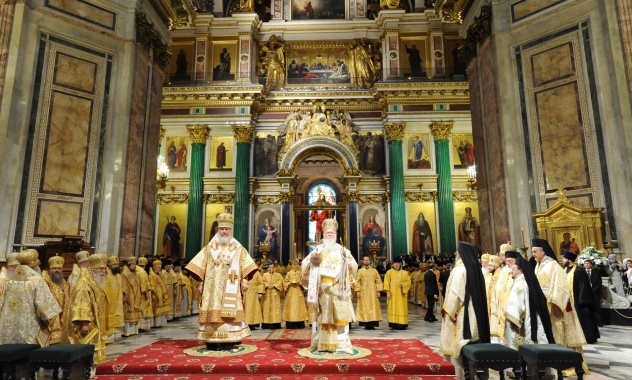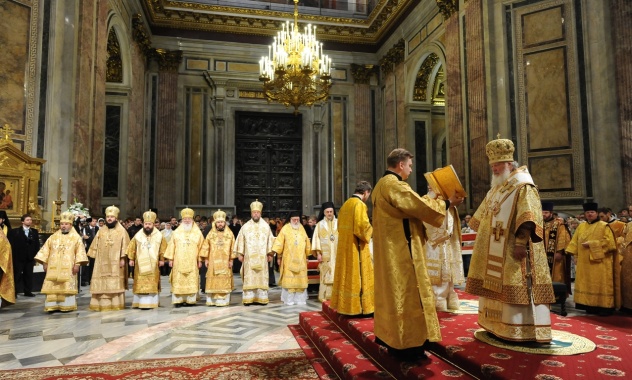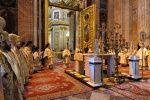Primates of Orthodox Churches of Constantinople and Russia celebrate Divine Liturgy at St. Isaac’s Cathedral in St. Petersburg
On 30 May 2010, the Sunday of All Saints, the Primates of the Orthodox Churches of Constantinople and Russia celebrated the Divine Liturgy at St. Isaac’s Cathedral in St. Petersburg.
Hierarchs and clergy of both Churches met His Holiness Patriarch Bartholomew and His Holiness Patriarch Kirill at the Admiralty Embankment. The procession went to the Cathedral, where thousands of believes have gathered.
Concelebrating with the Primates of the Orthodox Churches of Constantinople and Russia were Metropolitans Michael of Austria, Irinaios of Myriophyton and Peristasis, and Emmanuel of France, Metropolitans Vladimir of Kiev and All Ukraine, Vladimir of St.Petersburg and Ladoga, Patriarchal Exarch of All Belarus Philaret of Minsk and Slutsk, Juvenaly of Krutitsy and Kolomna, Vladimir of Kishinev and All Moldova, Chancellor of the Moscow Patriarchate Varsonofy of Saransk and Mordovia, Chairman of the Moscow Patriarchate’s Department for External Church Relations Hilarion of Volokolamsk, Agafangel of Odessa and Izmail, Archbishops Lev of Novgorod and Staraya Russa, Pavel of Vyshgorod, Ionafan of Abakan and Kyzyl, Yelisei of Surozh, Markell of Beltsy and Feleshty, Nazary of Vyborg, Bishops Sergiy of Solnechnogorsk and Aleksandr of Pereyaslav-Khmelnitsky, and many clerics.
Metropolitan Kallistos of Diocleia, Patriarchate of Constantinople, prayed at the sanctuary.
After the Divine Liturgy His Holiness Patriarch Kirill of Moscow and All Russia greeted the Primate of the Orthodox Church of Constantinople:
“Your Holiness Bartholomew, the Archbishop of Constantinople – New Rome and Ecumenical Patriarch, beloved in the Lord brother and concelebrant! Most Reverend brothers hierarchs! All-honourable fathers, brothers and sisters!
“A year has passed since my last visit to the city of Constantinople. Now I am happy to greet Your Holiness at my homeland, the holy city of Peter. These cities differ in age and epochs, but still have much in common. Both are under prayerful intercession of the Apostle Andrew the-First-Called; both have been destined to become the support and centre point of a great culture; both were capitals of the great Orthodox empires. However, these are not the only things that unite them.
“Human history had known many glorious cities and civilizations. Powerful as giants, grandiose as the Tower of Babel, they had raised themselves over the world up to the heavens; their names and actions had resounded throughout the earth. Yet, as Holy Scripture tells us, ‘God did not choose them, or give them the way to knowledge’ (Bar. 3:27), and the Psalmist said: ‘By their great might they cannot save’ (cf. Ps. 33:16). The towers of Babylon had become dust. Their unity had not stand up to the test of times, as it had not been firm, being based on the wrong ground.
“Yet there are other cities still alive in spite of all trials and tribulations. Their strength is not in the triumph of earthly power, economics, or military might, but in the spiritual greatness that they have embodied. I believe my native St. Petersburg and the city of Your Patriarchal Throne to be among them. There were many grieves and difficulties in their history, but the Name of Christ has always shone in them, keeping them from feebleness and oblivion.
“A city is a bulwark of the civilized world, an expression of its community and unity. An aspiration to achieve one and the same purpose is a foundation of any human association. A mean and transitory purpose cannot unite people for a long time. A fine and noble purpose helps the aspiration and those who aspire, and they become one in history and imprinted on eternity.
“The search for unity is inherent in the human person. It begins with preserving one’s own identity, with a wish to be wholesome. The aspiration to unity is revealed then in family and marriage, in the circle of relatives, friends and like-minded people. At last, a unity in aspiration to the best, the abandoned petty interests, and love of one’s homeland merge into the state and national unity.
“However, there is another community, which is unity in Christ and in the mysterious communion of the eternal good. This is not subject to the laws of this world or circumstances of our temporal life. Only those who in silent awe truly worship the One Holy Trinity can attain this unity, which can be found in our Holy, Catholic, and Apostolic Church. It is not fortuitous that the Sunday of All Saints follows the Day of the Holy Trinity and the Day of the Holy Spirit. Today we continue to celebrate Pentecost in the entire human race and in the whole Universal Church.
“The Church in this world is like this beautiful cathedral in which we have celebrated the Divine Liturgy. This cathedral has endured a lot and has undergone many changes in its outer appearance. Sometimes, the state of faith and the nation affected, but the grace that once sanctified it has always rested upon it invisibly. The cathedral has always been a church, even when it was a museum, since the grace bestowed upon it at its consecration has always abided here and been given to people who came here. Thus the Church on the earth lives and breathes by the grace of the Holy Spirit. Her eternity is in the Heavenly Church and in the saints of all nations and times. Like a golden dome of St. Isaac’s, the Church of the saints reigns above the earthly city and the dust of human aspirations, transcending legal boundaries and political differences.
“Your Holiness, dear brother! Today we have celebrated the unity of the Universal Church. We have known each other for a long time, and I am happy that with every meeting we are becoming closer to each other, that relations among the Local Churches are strengthening, and that the holiness and plenitude of Universal Orthodoxy overcome differences among us.
“We have common holy sites and common sanctity. We cherish your veneration of our holy sites, monasteries and churches of Moscow and St. Petersburg. The Laura of the Holy Trinity and the Valamo Monastery of the Transfiguration will remember you in prayers.
“When you visited Russia in 1993, you said that you were taking half of your heart with you, as you have left another half here. Let us hope that you will leave your whole heart here this time, but as your heart is the heart of the Primate of the Orthodox Church of Constantinople, it will be in your Church, too. We shall live in the unity of our hearts, warming each other and our people by our mutual love. My heart and the hearts of our believers will be with you always in prayers and in the unity of our Holy and Universal Church. Christ is in our midst!”
His Holiness Kirill presented His Holiness Bartholomew with the Feodorovskaya Icon of the Mother of God adorned with precious stones, noting that the first Romanov, Mikhail Feodorovich, was blessed to reign with this icon. The presented icon was made through the labours of Metropolitan Vladimir of St. Petersburg and Ladoga.
His Holiness Patriarch Bartholomew of Constantinople said in his address:
“Your Holiness!
The Prophet David was right saying that “our steps are made firm by the Lord” (Ps. 37:23). The Lord has guided our steps and those of the members of our delegation to you, and we arrived to humbly venerate the blessed Russian land, the land of the sacred treasures.
“We are now in the holy city, the city of Peter the Great, the heroic city. No one has the right to forget the heroic resistance of its inhabitants to the mighty and destructive forces of Nazism.
“Old news-reels instill terror into us, as we see the desperate and persistent struggle of the residents during nine hundred days of siege! They suffered from numerous attacks, merciless bombardment, and heavy artillery fire. By the very modest count, a million of people had died of military action, horrible hunger and diseases. Yet people were unshakeable, as a guard in Pompeii who remained at the gates even when a stream of scorching lava reached him.
“The city has become a symbol of heroism, steadfastness, and faith in the ideals of freedom.
“Since its foundation in 1703 by Peter the Great, the city changed its name four times because of political transformations, but it never betrayed piety of the fathers.
“St. John of Kronstadt gives a vivid example of that. Memory of him is alive, his miracles continue, and his prayers to the Lord are keeping the city and will keep it till the second coming of our Lord.
“There is another good coincidence. Peter the Great was born on 30 May 1672, and his birth brought about the construction of this cathedral on the commemoration day of the holy confessor St. Isaac of Dalmatia, who was born in Syria, but lived in Constantinople. During the reign of Emperor Theodosius, the saint established a monastery that has been a renowned spiritual centre for many centuries. The saint was a confessor who opposed Emperor Valent blinded by the Arian heresy.
“We have arrived here to venerate our holy fellow-countryman. There is no trace of his famous monastery, but we admire this magnificent cathedral built by your pious predecessors with the help of imperial treasury. The cathedral has lived through many reversals of fortune, once being even a museum of atheism. But God is alive! He has crushed all intentions of the mad people who declared that there was no God, and they have become “like the chaff of the summer threshing floors” (Dan. 2:35).
“St. Isaac is a strong chain, one of the fifty that indissolubly link the Church of St. Constantine and the New Rome with the Church of Russia and make them one tabernacle (cf. Ex. 26:6). The Holy Spirit wishes this indissoluble unity in faith, in the Tradition, and in the ecclesiastical practice. The Holy Spirit calls all to unity and constitutes the Council of the Church, which is “a garden locked” (Song. 4:12). The fence of this sacred garden will never be destroyed, and “a boar from the forest will not ravage it, and all that move in the field will not feed on it” (cf. Ps. 80:13). The Church “will put foreign enemies to flight” (Heb. 11:34), and the wolves will not penetrate it.
“We have said many words about generous hospitality and love of His Holiness Patriarch of Moscow and All Russia, our beloved brother Kirill, about generosity of His Eminence Metropolitan Vladimir of St. Petersburg and Ladoga, and about pious and blessed people who met us. However, we recall the words of our predecessor St. Gregory the Theologian, “spur your horse to the goal…that you may neither be displeased at its deficiencies, nor find it unpleasant through satiety.’
“We wholeheartedly thank you for all that we have heard and felt. We bless you with both hands. We pray to the Lord asking Him to give pastors and the flock good health for good labours through which the honourable and majestic name of our Heavenly Father will be glorified.
“The spring has come to the Russian land after severe winter, the spiritual spring, the spring of the souls, as St. Gregory said in his homily on Easter.
“Remain unshakeable in the holy Orthodox faith. We ask for your prayers for the Church of Constantinople that had suffered and been crucified for many centuries. Pray for the oil in the Phanar’s lamp that once illumined you to be abundant and for “a smoldering wick not to be quenched” (cf. Mt. 12:20). The Father is our hope, the Son is our refuge, and the Holy Spirit is our intercession!
“We believe that you will always pray for the great Church of Christ. We ask you, dear and beloved in the Lord children, to pray. We thank you, beloved Patriarch Kirill of Moscow and All Russia, for your love to us and our companions and for three concelebrations that proclaimed the unity of our Churches in the bond of peace. We bring blessings to the people of God from the Mother Church of Constantinople. As you have said, we leave our heart here, on this land, with this Church and this people. Let our unity and our brotherhood be to the glory of God and peace in the world. Christ is in our midst always!”
Other events
-
31.05.2010 11:34His Holiness Patriarch Bartholomew of Constantinople completes his visit to the Russian Orthodox Church
-
30.05.2010 23:53(Russian) В Екатерининском дворце Царского Села Предстоятель Русской Православной Церкви дал прием в честь Святейшего Патриарха Константинопольского Варфоломея
-
30.05.2010 15:32(Russian) Святейшие Патриархи Варфоломей и Кирилл посетили историческое здание Синода в Санкт-Петербурге
-
30.05.2010 13:02Primates of Orthodox Churches of Constantinople and Russia celebrate Divine Liturgy at St. Isaac’s Cathedral in St. Petersburg
-
29.05.2010 23:28Reception in honour of Patriarch Bartholomew of Constantinople and Patriarch Kirill of Moscow and All Russia at St. Alexander Nevsky’s Laura
-
29.05.2010 21:21Patriarch Bartholomew of Constantinople lifts up prayer at St. Alexander Nevsky’s Laura
-
29.05.2010 20:05Patriarch Bartholomew visits Hermitage, Cathedral of Our Lady of Kazan and Church of the Saviour-on-the-Blood in St. Petersburg
-
29.05.2010 13:51Primates of Orthodox Churches of Constantinople and Russia visit St. Nicholas’ Naval Cathedral in Kronstadt
-
28.05.2010 17:15(Russian) Святейший Патриарх Константинопольский Варфоломей посетил скиты Спасо-Преображенского Валаамского монастыря
-
28.05.2010 12:13(Russian) Вселенский Патриарх молился за Божественной литургией в Валаамском Спасо-Преображенском монастыре
-
27.05.2010 20:51Patriarch Bartholomew arrives at Valamo Monastery of the Transfiguration
-
27.05.2010 12:40His Holiness Patriarch Bartholomew of Constantinople arrives in St. Petersburg
-
27.05.2010 11:48Primate of the Orthodox Church of Constantinople departs for St. Petersburg
-
27.05.2010 11:38His Holiness Patriarch Bartholomew completes his stay in Moscow by visiting the Church of “The Joy to All the Afflicted” Icon of the Mother of God
-
27.05.2010 10:31(Russian) Святейший Патриарх Варфоломей посетил Посольство Турецкой Республики в Москве
-
26.05.2010 23:40(Russian) Предстоятель Константинопольской Православной Церкви посетил Посольство Греции в Москве
-
26.05.2010 21:35Primate of the Orthodox Church of Constantinople visits Moscow Representation of the Patriarchate of Jerusalem
-
26.05.2010 20:09Patriarch Bartholomew of Constantinople says prayer for the repose of Patriarch Alexy II of Moscow and All Russia’ soul
-
26.05.2010 18:43(Russian) Состоялась встреча Предстоятеля Константинопольской Православной Церкви с представителями греческой общины России и стран СНГ
-
26.05.2010 17:19(Russian) Святейший Патриарх Константинопольский Варфоломей посетил Антиохийское подворье в Москве
-
26.05.2010 16:04(Russian) В ходе визита в Русскую Православную Церковь Святейший Патриарх Константинопольский Варфоломей посетил Покровский монастырь в Москве
-
26.05.2010 15:13(Russian) Предстоятель Константинопольской Православной Церкви встретился с мэром Москвы Ю.М.Лужковым
-
26.05.2010 13:07(Russian) Святейший Патриарх Константинопольский Варфоломей посетил Свято-Димитриевское училище сестер милосердия
-
26.05.2010 11:27Patriarch Bartholomew of Constantinople visits Trinity Cathedral at St. Daniel’s monastery
-
26.05.2010 11:17THE WORLD AS SACRAMENT The Theological and Spiritual Vision of Creation: His All Holiness Ecumenical Patriarch Bartholomew
-
26.05.2010 11:15Patriarch Bartholomew of Constantinople visits Department for External Church Relations and gives lecture to students of Sts Cyril and Methodius Post-Graduate School
-
26.05.2010 09:13Delegations of Orthodox Churches of Constantinople and Russia hold talks
-
25.05.2010 16:01Primates of Orthodox Churches of Constantinople and Russia meet with Russian President Dmitry Medvedev
-
25.05.2010 13:59Primate of the Orthodox Church of Constantinople venerates relics in the Moscow Kremlin cathedrals
-
24.05.2010 22:01Primates of the Orthodox Churches of Constantinople and Russia attend concert in the State Kremlin Palace on the Day of Slavonic Literature and Culture
-
24.05.2010 18:06Patriarchs Bartholomew and Kirill visit Church Councils Hall and Church of Christ the Saviour’s museum
-
24.05.2010 15:09Primates of Orthodox Churches of Constantinople and Russia address participants in opening of Days of Slavonic Literature and Culture
-
24.05.2010 13:10(Russian) Слово Святейшего Патриарха Московского и всея Руси Кирилла за Божественной литургией в Храме Христа Спасителя 24 мая 2010 года
-
24.05.2010 13:03Primates of the Orthodox Churches of Constantinople and Russia celebrate on the Day of the Holy Spirit
-
23.05.2010 19:14His Holiness Patriarch Bartholomew of Constantinople visits the Moscow Representation of the Orthodox Church of Alexandria
-
23.05.2010 16:02His Holiness Patriarch Bartholomew of Constantinople honoured the memory of the late Patriarchs Alexy I and Pimen
-
23.05.2010 16:00His Holiness Patriarch Kirill: May God grant us that no human circumstances ever destroy the main thing in Orthodoxy – our unity in Holy Communion
-
23.05.2010 13:31Patriarchs Bartholomew and Kirill gave blessing to the pilgrims from the balcony of the Patriarchal residence in the Laura of the Hoy Trinity and St Sergius on the day of the Holy Trinity
-
23.05.2010 13:20(Russian) Слово Святейшего Патриарха Константинопольского Варфоломея в Успенском соборе Свято-Троицкой Сергиевой Лавры
-
23.05.2010 13:00Primates of the Orthodox Churches of Constantinople and Russia celebrate in the Laura of the Holy Trinity and St. Sergius on Pentecost
-
22.05.2010 17:00His Holiness Patriarch Bartholomew of Constantinople arrived on a visit to the Russian Orthodox Church
-
19.05.2010 14:59His Holiness Patriarch Bartholomew of Constantinople to visit the Russian Orthodox Church on 22-31 May 2010


















